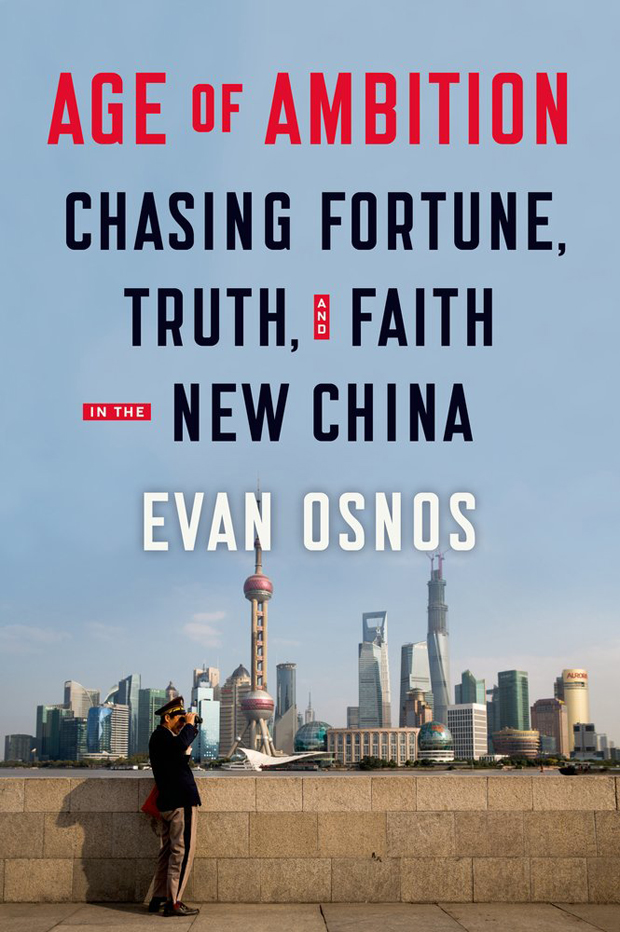The “slippery slope” of Chinese literary censorship
In a recent op-ed for The New York Times, American journalist Evan Osnos said that he turned down the opportunity to publish a copy of his new book Age of Ambition: Chasing Fortune, Truth, and Faith in the New China because an initial report from the censors came back asking for almost a quarter to be struck out.
The only surprising thing about this is that they were only planning to cut about 25%. Osnos’ book follows the lives of a cast of characters as they pursue their dreams – whether that be for money, for love, for dignity for freedom or justice. He does not hold back listing the faults of China’s authoritarian system – the corruption, the hypocrisy, the lies, the control, and the censorship itself. Among the cast of characters that Osnos follows a fair few are clearly a no-go – among them imprisoned dissident writer Liu Xiaobo, blind activist lawyer Chen Guangcheng and outspoken artist Ai Weiwei among them.
Osnos declined to publish because: “to produce a ‘special version’ that plays down dissent, trims the Great Leap Forward, and recites the official history of [former official] Bo Xilai’s corruption would not help Chinese readers. On the contrary, it would endorse a false image of the past and present. As a writer, my side of the bargain is to give the truest story I can.”
For Osnos it wasn’t just a matter of how much of the book would have to go — a lie is a lie whether it is a big one or a small one. He told Index on Censorship: “It’s a slippery slope. If you agree to cut five paragraphs or 10% of the text or 25%, where do you stop?”
Osnos’ op-ed has highlighted the dilemma writers face publishing in China. The mainland is now hungry for western works. A publisher approached Osnos and not the other way around. American journalist Peter Hessler, who was the Beijing correspondent for The New Yorker before Osnos, published two of his China books on the mainland, County Driving and River Town. He said that they both sold more than 150,000 copies in China. Country Driving actually sold more copies in China than they did in the US. In the first 10 months of last year, 650,000 censored copies of Deng Xiaoping and the Transformation of China by Ezra F. Vogel, professor emeritus at Harvard University, were bought in China. Around 10% of the book was excised.
Osnos wouldn’t compromise, but Hessler and Vogel did, for different reasons.
Hessler says he felt that he owed it to the people he was writing about to give them access to what he was saying about them. “The longer that I wrote about China, the less comfortable I was with the fact that readers in these places could not read what I was writing about them,” Hessler told Index on Censorship. “It’s an unhealthy dynamic that is common all over the developing world – the foreign correspondent often feels like he’s exporting stories. He doesn’t receive local feedback, and there’s a risk that he isn’t fully accountable to his subjects.”
Hessler’s books tend to follow communities and as such are less sensitive. “The general pattern is to cut references to national leaders or events, while leaving detailed descriptions of local events,” notes Hessler. Just a few pages were cut from both books out of more than 400 pages – changes, he thought, that did not “strike at the core of either book.” He did not try to publish another of his China books, Oracle Bones, because it was much more sensitive and would have faced significant cuts.
Vogel argued that his work opened the door to a more open discussion. “Many Chinese academics were appreciative that my book had expanded the range of freedom, allowing them to discuss more topics than had been possible before the book was published,” he wrote on The Harvard University Press website.
The danger is of course, even if the book does spark discussion, even if the censor does let some “sensitive” details slip through, readers are largely unaware of what was changed and thus the version they read ends up perpetuating the official line.
“If the censorship would change the point or substance of the book, then readers will come away with a, not just limited, but actually incorrect understanding of what the author was trying to say,” notes Eric Abrahamsen, an American publishing consultant and literary translator based in Beijing. “In the case of Evan Osnos’ book, losing 25% would mean that readers would believe that he thinks differently than he actually does. That would be incredibly pernicious, and isn’t remotely worth it.”
Vogel’s decision has earned him scathing criticism from Perry Link, Professor Emeritus of East Asian Studies at Princeton University. Link, who is famous for describing Chinese censorship as “the anaconda in the chandelier”, says that rather than opening the doors to discussion, Vogel’s censored book props up the Party’s line.
“The 10% that is omitted from Ezra’s book is not a random 10%,” he said. “It is a 10% that distorts the reader’s overall impression of the whole — i.e., the other 90% as well. Ezra’s book is very favourable to the regime. If 10% is omitted, it reads like a flat-out, all-out endorsement by a Harvard professor of Chinese Communist Party authoritarian rule.”
This article was published on June 20, 2014 at indexoncensorship.org

